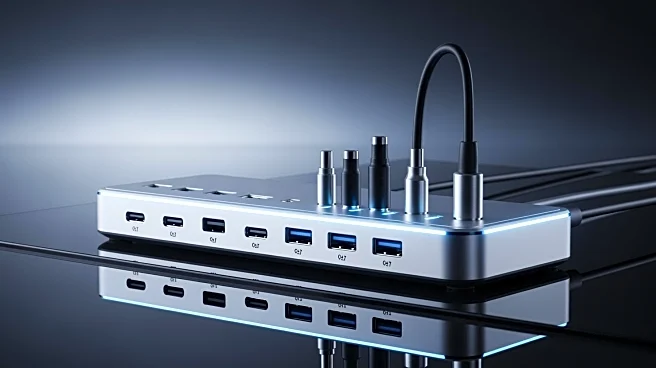What's Happening?
Nigeria's President Bola Tinubu has replaced several top security officials as the country faces persistent violence in the northern regions and various security challenges. The shake-up includes the dismissal
of Christopher Musa, chief of defense staff; Emmanuel Ogalla, chief of naval staff; and Hassan Abubakar, chief of air staff. Olufemi Oluyede, the former chief of army staff, has been appointed as the new chief of defense staff, while W. Shaibu, I. Abbas, and S.K. Aneke have been appointed as the chiefs of army, air force, and naval staff, respectively. This move comes amid rumors of a coup plot, which the government has denied, and ongoing protests demanding the release of separatist leader Nnamdi Kanu. The country is grappling with threats from various armed groups, including Boko Haram and its splinter factions, as well as criminal groups involved in kidnapping and looting.
Why It's Important?
The replacement of top security officials in Nigeria is significant as it reflects the government's urgent need to address the escalating violence and insecurity in the country. The decision to appoint new leaders in the defense sector is aimed at enhancing the professionalism and effectiveness of Nigeria's armed forces. This development is crucial for maintaining stability in a region plagued by insurgency and criminal activities. The U.S. government's recent approval of a $346 million arms sale to Nigeria underscores the international support for Nigeria's fight against these threats. However, the denial of a coup plot and the ongoing protests highlight the political tensions and public unrest, which could impact the country's governance and security strategies.
What's Next?
The newly appointed security officials are expected to focus on improving the operational capabilities of Nigeria's armed forces to combat the various security threats. The government may also need to address the underlying political and social issues contributing to the unrest, including the demands for the release of separatist leader Nnamdi Kanu. The international community, particularly the U.S., will likely continue to monitor Nigeria's security situation and provide support where necessary. The potential for further instability in West Africa, as seen in recent military takeovers in neighboring countries, remains a concern for regional security.
Beyond the Headlines
The changes in Nigeria's security leadership could have broader implications for the country's political landscape. The focus on regime protection, as suggested by security analysts, may influence the government's approach to addressing security threats. Additionally, the ongoing protests and public dissatisfaction could lead to increased pressure on the government to implement reforms and engage in dialogue with separatist groups. The situation in Nigeria also highlights the challenges faced by countries in West Africa in maintaining stability amidst complex security dynamics.









